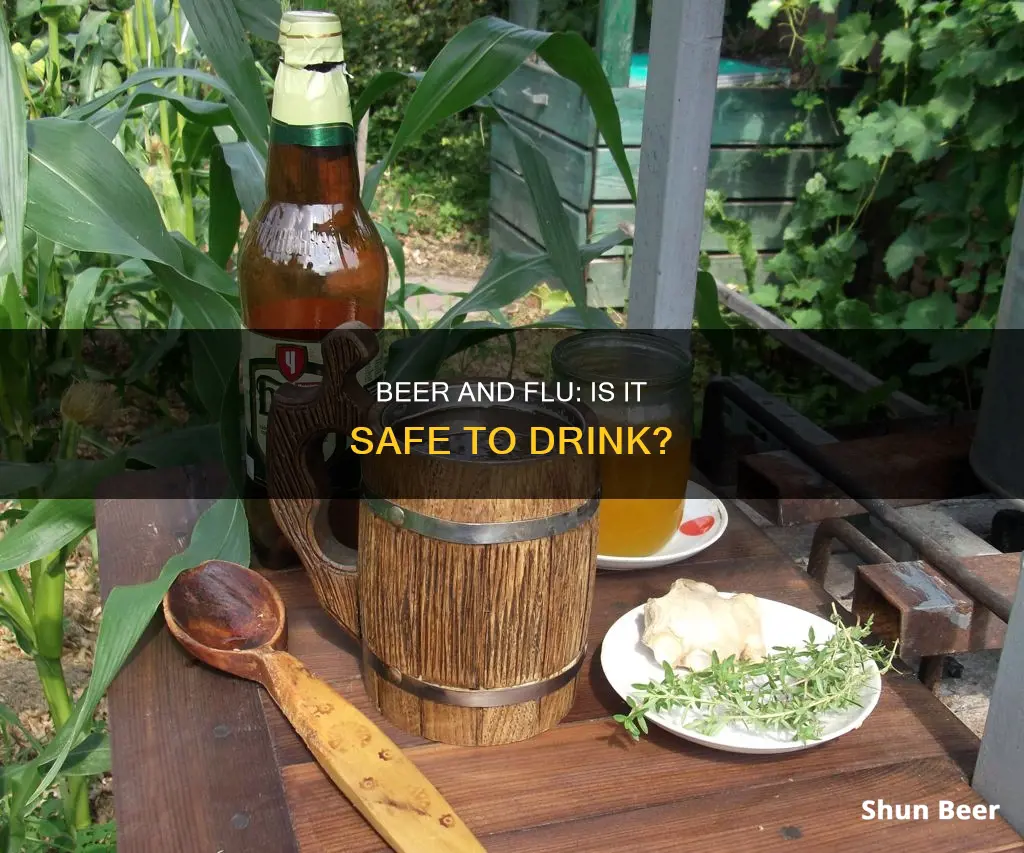
Drinking alcohol when you're sick is generally not recommended. Alcohol can have harmful interactions with many over-the-counter and prescription medications, and it can also negatively impact your immune system, making it harder for your body to fight off the infection. In addition, alcohol is dehydrating, which can worsen congestion and make it more difficult for your body to recover. While a small amount of alcohol may help you fall asleep faster, too much can disrupt your deep sleep phase, leading to feelings of anxiety and daytime drowsiness. So, if you're sick, it's best to avoid drinking beer or any other alcoholic beverage and focus on getting plenty of rest and staying hydrated.
| Characteristics | Values |
|---|---|
| Effect on immune system | Drinking alcohol can weaken the body's ability to fight off infection. |
| Effect on sleep | Alcohol can disrupt REM sleep, which may leave you feeling groggy. |
| Effect on dehydration | Alcohol is a diuretic, which increases the passing of urine and leads to dehydration. |
| Effect on medication | Alcohol negatively interacts with many cold and flu medications, including acetaminophen, chlorpheniramine maleate, pseudoephedrine, and phenylephrine. |
| Effect on symptoms | Alcohol can worsen common cold and flu symptoms such as headaches, nausea, vomiting, and fatigue. |
What You'll Learn

Beer and flu medication do not mix well
When you're feeling under the weather, it's best to skip the beer. Beer and flu medication do not mix well, and here's why:
Firstly, alcohol can negatively impact your immune system. When you're sick, your immune system is already working overtime to help your body heal. Consuming alcohol adds to its burden, as your body now has to fight off the alcohol on top of the disease. This can result in a slower recovery. Alcohol also impairs the gastrointestinal tract, which is essential for maintaining a strong immune system.
Secondly, beer and flu medication can have harmful interactions. Many flu medications, such as cough suppressants and antihistamines, can have severe side effects when combined with alcohol. These side effects include increased dizziness, drowsiness, impaired coordination, and a higher risk of liver damage or other serious health issues. Additionally, alcohol can interfere with the effectiveness of flu medications, making them less effective in treating your symptoms.
Thirdly, alcohol is dehydrating. When you're sick, staying hydrated is crucial for a speedy recovery. However, alcohol has the opposite effect. It triggers a diuretic response in the body, causing it to expel fluids rapidly through urination. This can worsen congestion and make it harder for your body to recover.
Lastly, drinking alcohol while taking flu medication can increase the risk of dangerous complications. These complications may include internal bleeding, liver damage, heart problems, and respiratory issues.
So, while it might be tempting to reach for a beer to soothe your flu symptoms, it's best to avoid alcohol altogether when you're sick. Consult with your doctor if you're unsure about the safety of combining a particular medication with alcohol.
Beer After a CT Scan: What You Need to Know
You may want to see also

Alcohol weakens the immune system
Drinking alcohol weakens your immune system, which is why it's not a good idea to drink beer when you have the flu.
Alcohol compromises the body's immune system and increases the risk of adverse health outcomes. According to the World Health Organization (WHO), alcohol consumption can increase your risk for infection as it damages the ability of your immune system to fight viral infections.
The National Institute of Alcohol Abuse and Alcoholism (NIAAA) states that alcohol damages the immune system by upsetting the balance of helpful and harmful bacteria in the gut, which is essential for immune system function. Alcohol can also allow microbes to leak from your gut and interfere with liver function. Heavy drinking may reduce immune system cells, such as white blood cells, increasing your risk for viral and bacterial infections.
Dr Nate Favini, medical lead at Forward, a preventive primary care practice, says:
> "By damaging those cells in your intestines, [alcohol] can make it easier for pathogens to cross into your bloodstream. That is, by drinking too much, you decrease your body's defensive mechanisms to fight off a cold, virus, or other bacterial or viral infections."
Drinking alcohol can also cause dehydration, which can make congestion worse when you're sick. Alcohol is a diuretic, increasing the passing of urine at a fast rate. It is broken down in the liver and converted into acetaldehyde, which can be harmful if it accumulates in the body.
Alcohol can also negatively impact sleep, which is crucial for recovery from illness. While a glass of wine might help you fall asleep, alcohol disrupts REM sleep, the most restorative type of sleep, which can leave you feeling groggy in the morning.
It's important to note that moderate alcohol consumption may not significantly weaken the immune system. One to two drinks a day is generally considered safe. However, it's best to refrain from drinking alcohol when sick, as it can prolong recovery and worsen symptoms.
Uncapping the Secret: Beer Vending Machines Simplified
You may want to see also

Alcohol is dehydrating
Drinking alcohol is dehydrating for several reasons. Firstly, alcohol is a diuretic, meaning it increases the passing of urine at a fast rate. Alcohol is broken down in the liver and converted into acetaldehyde, which can be harmful if it accumulates in the body. This conversion process also suppresses the production of the antidiuretic hormone vasopressin, which causes the body to lose fluids, leading to dehydration.
Secondly, when you drink alcohol, it gets absorbed into your bloodstream within minutes, especially if you're drinking on an empty stomach. From there, alcohol can travel anywhere in your body, including your brain and lungs. As your body metabolises alcohol, it gets turned into nutrients and energy, but this happens slowly, at a rate of about one drink per hour.
Thirdly, alcohol interferes with the mechanism that regulates water levels in your body. The pituitary gland in your brain produces the hormone vasopressin, which stops you from urinating too much, helping you retain water. However, alcohol reduces the production of this hormone, leading to increased urine production and dehydration.
Finally, when you're sick, it's important to keep the lining of your nose and throat moist to thin out mucus and help you cough or blow it out easily. Drinking alcohol while sick can make this worse, as it can cause dehydration and further congestion.
To prevent dehydration when drinking alcohol, it's important to drink plenty of water, eat vitamin-rich foods, and limit your daily intake of alcohol.
Beer and Health: One Beer a Day, Okay?
You may want to see also

Alcohol disrupts sleep
Alcohol also turns on a sleep pattern called alpha activity, which keeps your body from getting deep sleep. This is because alcohol increases the production of adenosine, a chemical in the brain that acts as a sleep-inducer, allowing you to fall asleep quickly. However, this chemical quickly subsides, making it more likely that you will wake up throughout the night.
Alcohol also has an impact on your sleep depending on the amount you consume. A 2018 study found that low alcohol intake reduced sleep quality by 9.3%, moderate alcohol intake by 24%, and heavy alcohol intake by nearly 40%.
Overall, while alcohol may help you fall asleep faster, it will likely disrupt your sleep throughout the night, leaving you feeling groggy in the morning.
Chemo and Alcohol: Is Drinking Beer Safe?
You may want to see also

Alcohol can cause internal bleeding
Drinking alcohol when you have the flu is generally not recommended. Alcohol can prolong your recovery from the flu by weakening your immune system and disrupting your sleep. It can also worsen symptoms such as headaches, nausea, and fatigue. Additionally, alcohol can cause dehydration, which can make congestion worse.
Furthermore, alcohol can increase the risk of internal bleeding. Alcohol abuse can lead to internal bleeding within the body's major systems, including the gastrointestinal tract. Alcohol interferes with the functioning of the muscles in the esophagus and stomach, increasing the likelihood of heartburn problems. It can also damage the linings of the esophagus and stomach, setting the stage for internal bleeding.
The small intestines are also affected by alcohol consumption. The toxic effects of alcohol can inhibit nutrient absorption through the walls of the small intestine while allowing harmful toxins to pass into the bloodstream. This can lead to alcoholic ketoacidosis, where the body breaks down fat tissues as a source of nutrients, and the resulting high levels of ketone acids can tear up the gastrointestinal tract, causing internal bleeding.
Alcohol abuse is also associated with cirrhosis of the liver, which can lead to fluid build-up in the abdomen and bleeding in the esophagus. Internal bleeding from alcohol abuse can cause serious health consequences, including organ failure, shock, and even death.
Therefore, it is important to consume alcohol in moderation and be aware of the potential risks associated with alcohol abuse, especially when you are already dealing with the flu or other illnesses.
Beer and Steroid Shots: Safe Mix or Health Risk?
You may want to see also
Frequently asked questions
It is not recommended to drink beer or any other alcoholic beverage when you have the flu. Alcohol can worsen flu symptoms and medication side effects, and can also prevent medications from working effectively.
Drinking alcohol when you have the flu can cause negative side effects such as vomiting, headaches, dizziness, and fainting. It can also lead to more serious complications, including internal bleeding, liver damage, heart and respiratory problems, and dehydration.
Beer contains humulone, a chemical compound that can fight off the common cold virus. However, you would need to drink a significant amount of beer to benefit from these effects. Additionally, a small amount of alcohol can help you fall asleep faster, but it can disrupt your deep sleep phase if you drink more than one standard drink.







